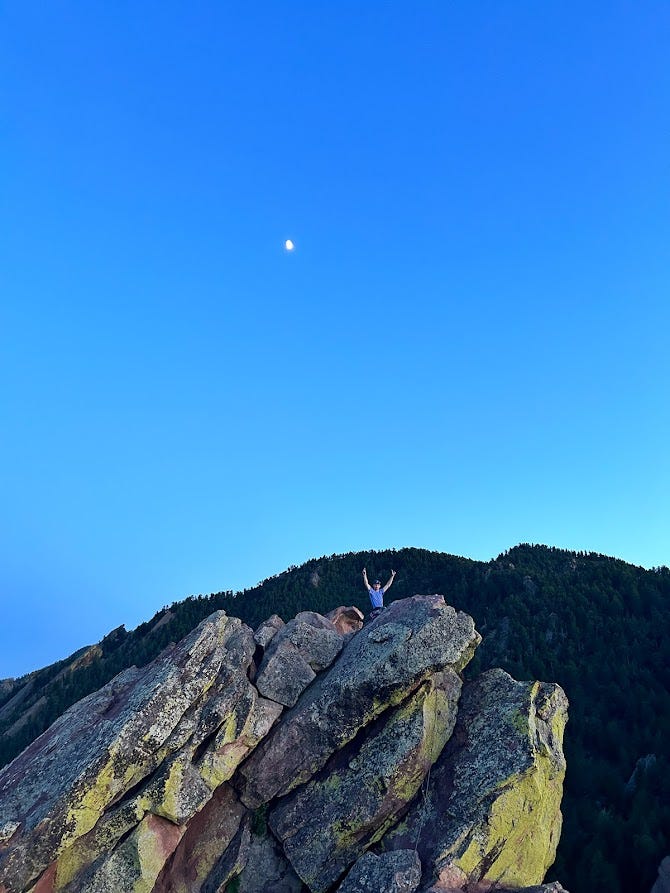Mixing Memory and Desire
Rage & tranquility; decay & rebirth; memory & desire.
I awoke on Friday morning of last week, feeling tired from reading too late the night before after retiring early to my room while my friends continued a weeknight bout of revelry. When I arrived in my kitchen, on the whiteboard next to the refrigerator was written a partial stanza that distracted me from the composition of my breakfast:
April is the cruelest month, breeding
Lilacs out of the dead land, mixing
Memory and desire, stirring
Dull roots with spring rain.
Winter kept us warm, covering
Earth in forgetful snow, feeding
A little life with dried tubers.
Beneath these lines, a dashed attribution to T.S. Eliot answered my question as to who had written it; the handwriting also answered my question as to who had written it: my roommate, Brian.
The night before, Brian and I had been discussing the pro climber, Daniel Woods. His Instagram bio simply states “rage & tranquility.”
“Black and white; yin and yang; rage and tranquility” we had joked. Something about this Manichean summary of Woods’ climbing style made such intuitive sense in the context of an athlete pushing the limits of what is possible; Woods is one of two people who have proposed a V17 boulder problem and has, over the years, climbed at the leading edge of the hardest known climbs in the world. When you’re at the frontier of the possible, perhaps even leaning out beyond it, your mental game is just as important as your physical conditioning.
In an Instagram post from shortly before his successful climb of Return of the Sleepwalker V17, Woods wrote:
I’m coming up on 3 months of only trying the same shit. Shit starts to mentally add up haha. Why didn’t I go session other lines? Well I told myself if I wanted to climb the hardest shit I’ve tried then complete obsession needs to occur. This line has taken over my life the last 3 months. I don’t sleep at night because of it. I don’t think about anything else in life besides internally feeling my flow on this thing. Figuring out how to speed sections up, when to breathe, when to hold my breath, when to ramp up, when to slow down.
I have quit substances such as alcohol, tobac, weed, and coffee that used to plague my life (though I have no issues with weed haha... but I need full mental clarity atm). Whatever comes out of this process, send or no send, it has been a positive experience. I feel the best I’ve ever felt in life and know what it truly means to fucking push yourself and want something. In the end this is just a fuckin rock I’m trying to get up haha. The self clarity that has been awakened is what gives this experience purpose.
Complete obsession. Speeding up, slowing down. Send or no send. Self clarity and purpose. All or nothing.
Rage and tranquility.
I read the carefully-scribbled lines on the whiteboard again. The almost oxymoronic cruel April and warm Winter are both interesting constructions. “Tubers” is a funny word. But more than anything, I keep rereading the words “mixing memory and desire.”
Memory and desire.
These words recall the duality Brian and I had examined the night before. But these concepts are not opposites, or even natural complements, really. Why has this phrase gotten stuck in my mind?
I’ve experienced numerous change in my life since the start of this year: changes to my job and where I have to physically spend time, some big relocations and life milestones for close friends, some small injuries, and, perhaps most significantly, a painful breakup. These events have definitely triggered sentiments of memory and desire.
Memory implies recall and reflection on the past. Desire, meanwhile, is anticipatory: what do you want in the future? Nostalgia—which could be defined as a desire to relive memory—is a product of the mixing of these ideas. These combined concepts help you to orient yourself in the future, too; memories inform what you desire.
Perhaps there is some second-order duality in this combination after all.
I went climbing with Brian last night. On the drive to the trailhead, I asked him why he had written the opening lines of The Waste Land on the whiteboard last week.
He said that he couldn’t remember what had compelled him to copy it down. We both agreed that we lack the erudition to make sense of the poem itself. Brian said he must have had to read it in school at some point but that he didn’t know the poem well.
“The only part of the poem that I really remembered,” Brian said, “was the opening: ‘April is the cruelest month.’ I don’t know what made me recall that line. I just wanted to write it down.”
After reading a draft of this post, Brian sent me the following message; reproducing it in full felt appropriate.
But these opening lines of The Wasteland, and the epic poem as a whole, appear to probe the universal themes of decay and rebirth — these concepts themselves not so far removed from memory and desire, if one squints the eyes — and particularly this fascinating, nebulous middle ground of their juxtaposition where simple meaning and straightforward answers cannot be found.
Perhaps the poem appeared in the mind (and subsequently, on the whiteboard) in much the same way that tubers pop up unexpectedly after a long winter… Attribute it to memory if you wish, or desire, or some intangible mixing of the two that you can’t quite pin down.
Thanks Brian for the thoughts and the intellectual stimulation.



